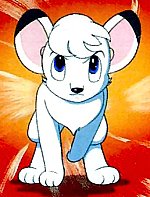Kimba the White Lion (TV series) facts for kids
Kimba the White Lion is a famous Japanese animated TV series. It was originally called Jungle Emperor Leo (ジャングル大帝, Janguru Taitei) in Japan. This show was made by Mushi Production in 1965.
The series is based on a manga (Japanese comic book) created by Osamu Tezuka. It was shown on Fuji TV in Japan from October 6, 1965, to September 28, 1966. Kimba the White Lion was special because it was the first full-color Japanese anime ever shown on TV! The series had 52 episodes. It even won awards, like the Special Award of the 4th TV Editors' Award in 1966. Since it first aired, many sequel TV shows, movies, and remakes have been made.
Contents
The Story of Kimba
The story of Kimba the White Lion starts in Africa. Human hunters begin to capture many animals. A young lion cub named Kimba (who is called Leo in the Japanese version) and his mother, Eliza, are among these animals. Kimba's father, Caesar (Panja in Japanese), was the king of the jungle. He bravely tried to save Kimba but was sadly killed.
The ship carrying Kimba and his mother starts to sink. Kimba's mother helps him escape, and he finds his way back to the jungle. During his journey, Kimba learns many things. When he finally returns home, he becomes a leader for the animals, just like his father.
Kimba's main goal is to bring peace between humans and animals. He tries to do this by teaching the animals human techniques, like farming. This helps the animals live better lives and understand humans more.
Main Characters and Voices
Here are some of the main characters from the original Japanese series and their voice actors:
- Leo/Kimba: Voiced by Ota Toshiko
- Lyre: Voiced by Matsuo Keiko
- Tommy: Voiced by Akashi Hajime
- Coco: Voiced by Tamura Kinto
- Mandy: Voiced by Katsuta Hisashi
- Totto: Voiced by Kato Seizo
- Dick: Voiced by Kawakubo Kiyoshi
- Bo: Voiced by Kumakura Kazuo
- Kenichi: Voiced by Sekine Nobuaki
- Mary: Voiced by Yamamoto Yoshiko
- Higeoyaji: Voiced by Chiba Junji
Kimba Around the World
After its first showing in Japan in 1965, Kimba the White Lion became popular all over the world. It was shown in many countries, letting kids everywhere enjoy Kimba's adventures.
In North America, the show was broadcast in Canada and Mexico. It was also shown in the United States starting in 1966. For English-speaking audiences, the series was dubbed into English. Billie Lou Watt voiced Kimba in the first English version. This version was very popular and was released on DVD later. In 1993, the series was re-dubbed with new voices and music.
Other Kimba Stories
Over the years, many other TV shows and movies based on Kimba the White Lion have been made. These often tell new stories or retell the original one.
New Jungle Emperor, Go Ahead Leo! (1966)
This TV series is a sequel to the first 1965 show. It takes place in the future when Leo (Kimba) is a grown-up lion. Osamu Tezuka wanted to show all parts of Leo's life. The episodes follow Leo and his family, Lyre, Rune, and Rukkio, as they face many challenges in the jungle.
Jungle Emperor Leo (1966 Film)
This was a full-length movie based on the Jungle Emperor Leo manga. The movie's story is not connected to the 1965 TV series. It's another way of telling Osamu Tezuka's original story. This film won an award at the Venice International Film Festival in 1967.
Jungle Emperor Leo (1989 TV Series)
This TV series is a remake of the 1966 show. It was made by Tezuka Productions. It aired from 1989 to 1990 and also had 52 episodes, just like the first series. This version also focused on Kimba's (Leo's) early life.
Jungle Emperor Leo (1997 Film)
Released in 1997, this movie also follows a story similar to the original manga. It shows Leo's entire life. A big difference in this film is that it features the original ending that Osamu Tezuka planned for Leo. While the 1966 TV sequel had a happy ending for younger viewers, this movie ends with Leo making a big sacrifice to bring peace to all life.
Jungle Emperor Leo: The Brave Changes the Future (2009)
This TV special is a remake of the original series but with a new storyline. It's set in the future, in an artificial jungle created by humans. A lion cub named Leo is born and grows up in this special environment. This show was made to retell the story of Jungle Emperor Leo for a new generation of viewers.


